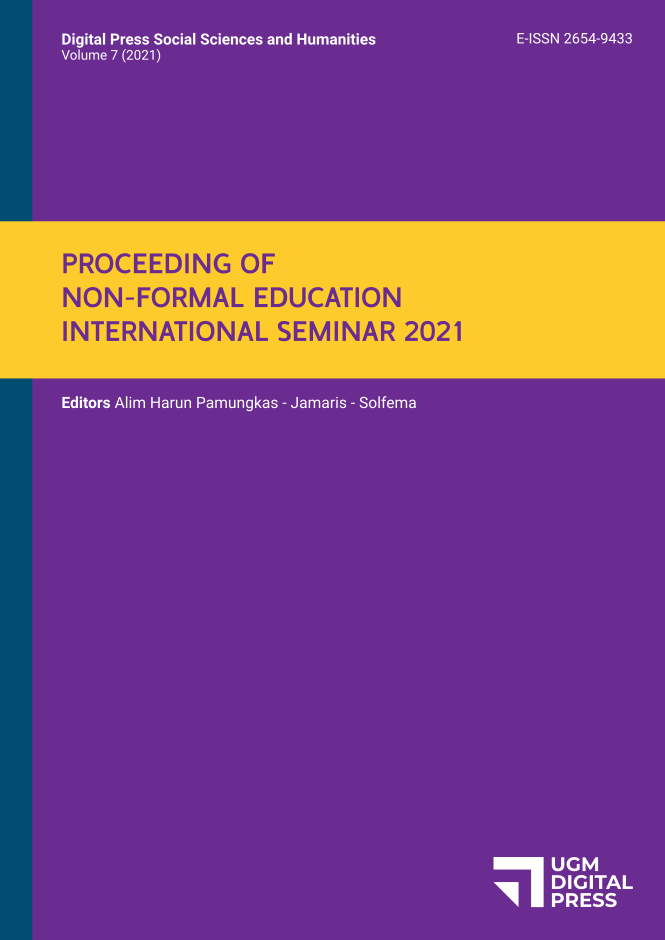The Model of Family Education in Developing Prosocial for Early Children on Playing in Public Facilities During Covid-19
Setiawati
Department of Non Formal Education Universitas Negeri Padang, Padang, Indonesia
setiawatipls@fip.unp.ac.id
Abstract
This research is motivated by the low participation of parents in the development of children's prosocial activities in the arena of public facilities, which results in poor prosocial abilities of children. This can be seen from the behavior of early childhood who like to monopolize the game, not patiently waiting for their turn, likes to hit friends, and does not like friends, do not want to share and so forth. The purpose of this study was to describe the developing prosocial for Early children on playing in public facilities during Covid-19. This article design be Systematic literature Review (SLR): (1) Parents can develop children’s prosocial behavior in the playground using adaptive model (a model adapted to the needs and age of the child), so that can be easily understood and adapted to the conditions of the child, parents, and existing playground equipment (2) Covid-19 has impacted children’s social development, children interact less with others. Parents need to develop their children’s prosocial in their daily activities at home and the playground (3) The providers of the public playground facilities and parents should strictly paying attention on health protocols, such as making sure the physical distancing, and providing proper hand washing facilities
Keywords
Model development, prosocial, family, covid-19
References
Ariati, N. N., Fetria, A., Purnamawati, A. A. P., Suarni, N. N., Padmiari, I. A. E., & Sugiani, P. P. S. (2018). Description of nutritional status and the incidence of stunting children in early childhood education programs in Bali-Indonesia. Bali Medical Journal, 7(3). https://doi.org/10.15562/bmj.v7i3.1219
Azizah, N., & Kurniawati, Y. (2013). Personal Hygiene Learning in Preschool Classroom. Indonesian Journal of Early Childhood, 2(2), 50–57.
Hurlock, E. B. (2000). Psikologi Perkembangan. Jakarta: Erlangga.
Napora, E. (2015). Factors Affecting Socialization from the Perspective of the Study of a School Child. 2(463), 135–143. https://doi.org/10.17770/sie2015vol2.463
Natsiopoulou, T., Vidali-Laloumi, E., Zachopoulou, E., & Trevlas, E. (2010). An innovative preschool health education program. Health Science Journal, 4(2), 110–117.
Nurmalitasari, F. (2015). Perkembangan Sosial Emosi pada Anak Usia Prasekolah. Buletin Psikologi, 23(2), 103–111.
Syaparuddin, S. (2020). Peranan Pendidikan Nonformal Dan Sarana Pendidikan Moral. Jurnal Edukasi Nonformal, 1(1), 173–186.
setiawatipls@fip.unp.ac.id
Abstract
This research is motivated by the low participation of parents in the development of children's prosocial activities in the arena of public facilities, which results in poor prosocial abilities of children. This can be seen from the behavior of early childhood who like to monopolize the game, not patiently waiting for their turn, likes to hit friends, and does not like friends, do not want to share and so forth. The purpose of this study was to describe the developing prosocial for Early children on playing in public facilities during Covid-19. This article design be Systematic literature Review (SLR): (1) Parents can develop children’s prosocial behavior in the playground using adaptive model (a model adapted to the needs and age of the child), so that can be easily understood and adapted to the conditions of the child, parents, and existing playground equipment (2) Covid-19 has impacted children’s social development, children interact less with others. Parents need to develop their children’s prosocial in their daily activities at home and the playground (3) The providers of the public playground facilities and parents should strictly paying attention on health protocols, such as making sure the physical distancing, and providing proper hand washing facilitiesKeywords
Model development, prosocial, family, covid-19References
Ariati, N. N., Fetria, A., Purnamawati, A. A. P., Suarni, N. N., Padmiari, I. A. E., & Sugiani, P. P. S. (2018). Description of nutritional status and the incidence of stunting children in early childhood education programs in Bali-Indonesia. Bali Medical Journal, 7(3). https://doi.org/10.15562/bmj.v7i3.1219
Azizah, N., & Kurniawati, Y. (2013). Personal Hygiene Learning in Preschool Classroom. Indonesian Journal of Early Childhood, 2(2), 50–57.
Hurlock, E. B. (2000). Psikologi Perkembangan. Jakarta: Erlangga.
Napora, E. (2015). Factors Affecting Socialization from the Perspective of the Study of a School Child. 2(463), 135–143. https://doi.org/10.17770/sie2015vol2.463
Natsiopoulou, T., Vidali-Laloumi, E., Zachopoulou, E., & Trevlas, E. (2010). An innovative preschool health education program. Health Science Journal, 4(2), 110–117.
Nurmalitasari, F. (2015). Perkembangan Sosial Emosi pada Anak Usia Prasekolah. Buletin Psikologi, 23(2), 103–111.
Syaparuddin, S. (2020). Peranan Pendidikan Nonformal Dan Sarana Pendidikan Moral. Jurnal Edukasi Nonformal, 1(1), 173–186.

